Choosing the right medical alert system is vital for ensuring your safety and peace of mind. In emergencies, quick access to help can make all the difference. That’s why we recommend Medical Guardian as the top medical alert system available. With comprehensive at-home and on-the-go devices, including features like long device range, extended battery life, and reliable 24/7 monitoring, Medical Guardian is the perfect choice to keep you protected.
Medical alert systems are essential for individuals of all ages, especially those with health conditions and seniors who live alone. These systems provide a direct connection to a monitoring center, which ensures that help is just a button press away. With Medical Guardian, you can trust that you’ll receive the assistance you need, when you need it most.
Key Takeaways:
- Medical Guardian is the top pick for the best medical alert systems.
- Choose a medical alert system that offers comprehensive coverage both at home and on the go.
- Consider factors like range, battery life, and a reliable monitoring center when selecting a medical alert system.
- Medical alert systems provide peace of mind and quick access to emergency help.
- Ensure the system you choose is compatible with your home phone line or cellular network.
How Medical Alert Systems Work
A medical alert system is a device that provides fast access to emergency help with the press of a button. It connects the user to a 24/7 monitoring center, ensuring prompt assistance in case of a fall or medical emergency. These systems are designed to enhance the safety and independence of older adults and individuals with health conditions.
When an emergency occurs, simply pressing the button on the medical alert device triggers a signal that reaches the monitoring center. Trained professionals at the center assess the situation and immediately contact emergency services if necessary. This quick response time can make a significant difference in critical situations, providing peace of mind for both users and their loved ones.
Medical alert systems offer a range of benefits that contribute to a sense of security and well-being. The around-the-clock monitoring ensures that help is always available, no matter the time or day. In addition, these systems often come with features like location tracking, allowing emergency responders to locate the user quickly.
The connection type of medical alert systems can vary based on the device. Some systems use a landline connection, others are cellular-based, and some offer Wi-Fi connectivity. The choice of connection type depends on factors such as the user’s location, lifestyle, and preferences.
Overall, medical alert systems serve as a lifeline in times of need, providing individuals with a reliable means of accessing emergency help. With their ability to reduce the risk of living alone and ensure prompt assistance, these systems offer the peace of mind that comes from knowing help is just a button press away.
Top Medical Alert Systems of 2024
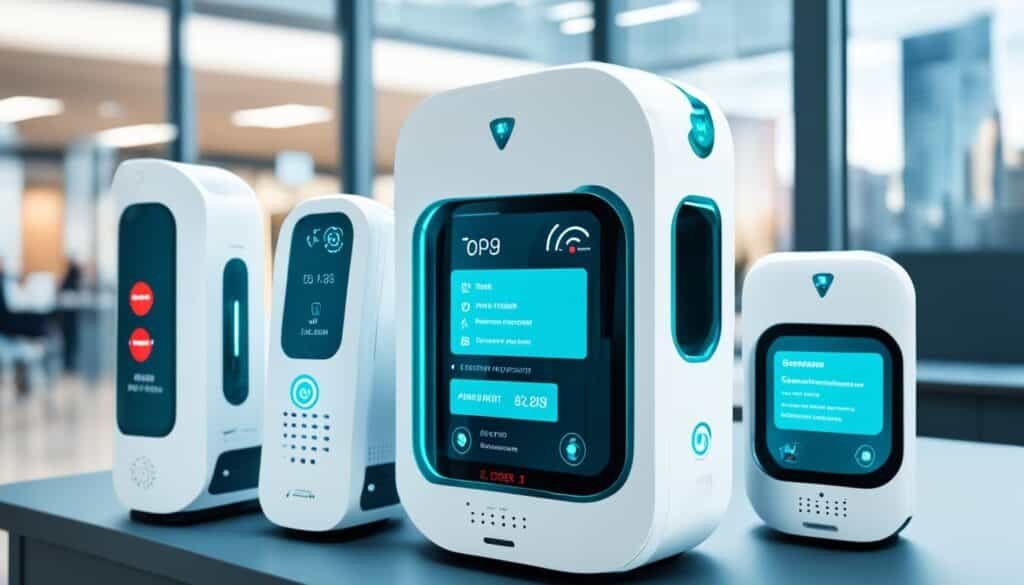
When it comes to medical alert systems, it’s essential to choose one that meets your specific needs. In 2024, there are several top-notch options available. Here are the best medical alert systems of 2024:
| System | Connection Type | Range | Battery Life | Response Time |
|---|---|---|---|---|
| MobileHelp | Cellular | 600-1,400 feet | Up to 5 days | Less than 30 seconds |
| Medical Guardian | Cellular | 1,300-1,400 feet | Up to 5 days | Less than 30 seconds |
| Medical Alert | Landline | 800 feet | Up to 2 days | Less than 30 seconds |
| Bay Alarm Medical | Cellular | 1,000 feet | Up to 32 hours | Less than 45 seconds |
| LifeFone | Landline/Cellular | 1,300 feet | Up to 30 hours | Less than 30 seconds |
| ADT Health | Cellular | 300-600 feet | Up to 72 hours | Less than 45 seconds |
| UnaliWear Kanega Watch | Wi-Fi/Cellular | N/A | Up to 24 hours | Less than 60 seconds |
These top medical alert systems of 2024 offer various features and options. From different connection types to extended ranges and long battery life, there’s a system to suit every individual’s needs. Whether you prefer a cellular or landline connection, rest assured that help is just a press of a button away.
When considering a medical alert system, it’s crucial to evaluate the range, battery life, and response time. These factors play a significant role in the effectiveness and reliability of the system. With the information provided, you can make an informed decision and choose the best medical alert system that meets your specific needs.
Choosing the Right Medical Alert System
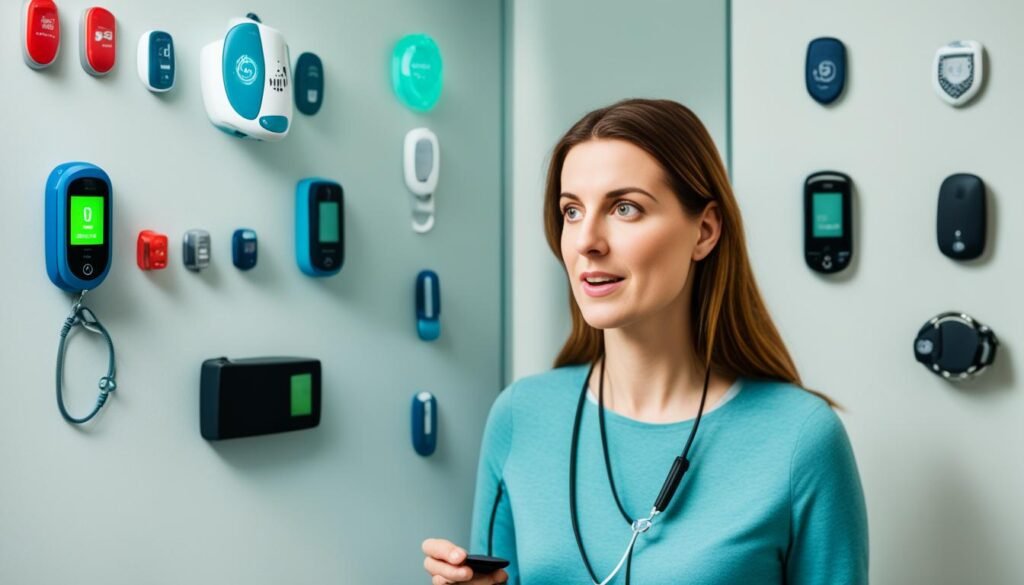
When it comes to selecting a medical alert system, several factors should be taken into consideration to ensure you choose the right system that meets your specific needs and requirements. To make an informed decision, consider the following key factors:
Price
Compare the cost of different medical alert systems, taking into account both the upfront fees and monthly monitoring fees. Look for a system that provides the best value for your budget while offering the necessary features and services.
Range
Assess the range of the medical alert system, which indicates the distance between the base unit and the wearable device. Opt for a system with a range that suits your living space, whether you require coverage only within your home or on-the-go capabilities.
Connection Type
Determine the appropriate connection type for your medical alert system. Options include landline, cellular, or Wi-Fi connection. Ensure that the system you choose is compatible with your existing home phone line or cellular network coverage.
Battery Life
Check the battery life of the medical alert device. Look for devices that offer long-lasting battery power to avoid frequent recharging, which contributes to overall convenience and reliability.
Response Time
Consider the response time of the monitoring center associated with the medical alert system. Look for a system that provides a prompt and reliable response during emergencies, as every second counts when seeking assistance.
Fall Detection
Some medical alert systems offer fall detection technology as an additional feature. This feature automatically detects falls and triggers an emergency response. Evaluate whether this feature is important for your situation.
Additional Services
Explore any additional services offered by the medical alert system, such as check-ins or GPS tracking. These services can enhance the overall effectiveness and usability of the system, providing extra peace of mind.
By carefully considering these factors and comparing different brands and models, you can choose the right medical alert system that best aligns with your needs. Remember, it’s crucial to prioritize the safety and well-being of yourself or your loved ones when making this important decision.
| Factors to Consider | Medical Alert System A | Medical Alert System B | Medical Alert System C |
|---|---|---|---|
| Price | $29.99/month | $24.99/month | $34.99/month |
| Range | 900 feet | 800 feet | 1,000 feet |
| Connection Type | Cellular | Landline | Cellular |
| Battery Life | 4 days | 3 days | 5 days |
| Response Time | 20 seconds | 30 seconds | 15 seconds |
| Fall Detection | No | Yes | No |
| Additional Services | Check-ins | GPS Tracking | Check-ins |
Features of Medical Alert Systems
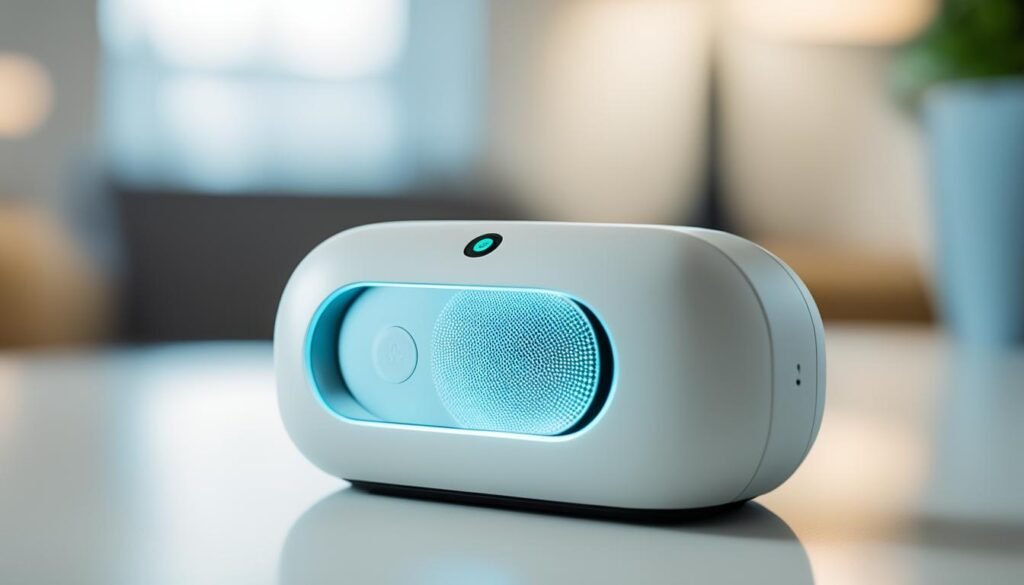
Medical alert systems offer a range of features that enhance safety and peace of mind for users. These features include:
Emergency Button
The emergency button is a vital feature of medical alert systems. With just a press of a button, users can quickly call for help during emergencies. Once activated, the system immediately connects users to a 24/7 monitoring center where trained professionals can assess the situation and dispatch the necessary assistance.
Fall Detection
Fall detection is an invaluable feature, especially for individuals prone to accidents or who may have limited mobility. This technology uses sensors to detect sudden falls and automatically triggers an emergency response. Prompt medical attention can be dispatched to the user’s location, even if they are unable to press the emergency button themselves.
GPS Tracking
GPS tracking is a feature commonly found in on-the-go medical alert systems. It allows precise location tracking, ensuring that help can be sent to the user’s exact location in case of an emergency. This feature is particularly beneficial for individuals who enjoy outdoor activities or have a tendency to wander.
Additional Features
- Check-in Calls: Some medical alert systems provide the option for periodic check-in calls to ensure the user’s well-being.
- Health Vitals Monitoring: Certain systems offer the capability to monitor vital signs, such as heart rate and blood pressure, providing additional assurance and aiding in medical assessment.
- Voice Recognition: Voice recognition technology allows users to initiate an emergency call hands-free simply by speaking a command, making it convenient for individuals with limited mobility.
When selecting a medical alert system, it’s essential to assess which features align with individual needs and preferences. Consider the specific requirements of the user or loved one to ensure the chosen system provides the necessary level of support and protection.
| Feature | Description |
|---|---|
| Emergency Button | Enables users to call for immediate help during emergencies. |
| Fall Detection | Detects falls automatically and triggers an emergency response. |
| GPS Tracking | Allows accurate location tracking for on-the-go devices. |
| Check-in Calls | Enables regular check-ins for user well-being. |
| Health Vitals Monitoring | Monitors vital signs to aid in medical assessment. |
| Voice Recognition | Allows hands-free initiation of emergency calls through voice commands. |
Benefits of a Medical Alert System
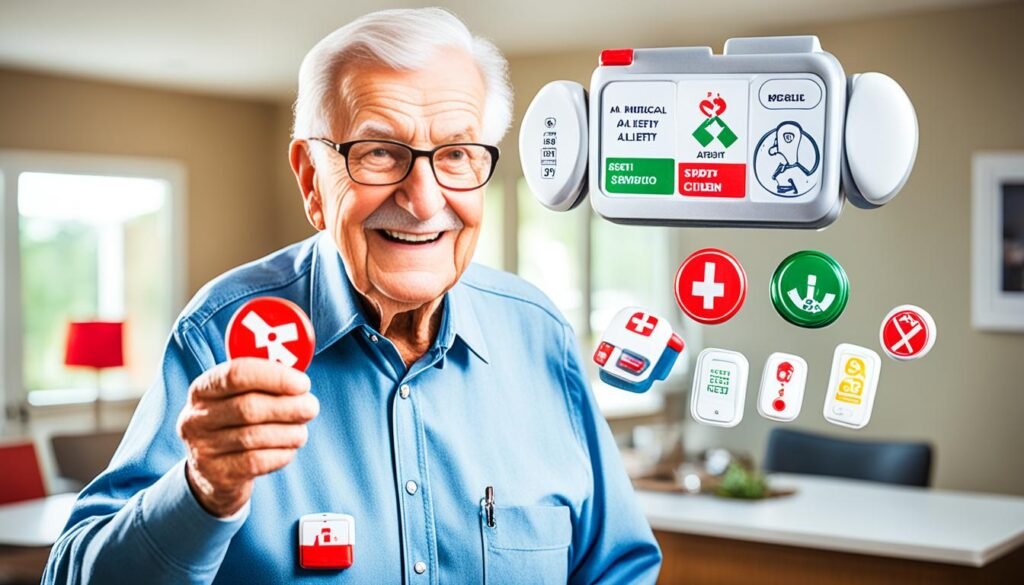
A medical alert system provides several benefits that ensure the safety and well-being of individuals, offering peace of mind for both users and caregivers. These systems offer quick access to emergency help, around-the-clock monitoring, location tracking, and more.
- Quick access to emergency help: In the event of a fall or medical emergency, a medical alert system allows users to call for help instantly with the press of a button. This ensures timely assistance, even when caregivers are not present.
- Around-the-clock monitoring: Medical alert systems provide 24/7 monitoring services, ensuring that help is always available when needed. The monitoring center is staffed with trained professionals who can assess the situation and contact emergency services if necessary.
- Location tracking: Many medical alert systems are equipped with GPS technology, which allows for accurate location tracking. This feature is particularly useful for on-the-go devices, enabling emergency responders to locate the user quickly.
- Peace of mind: Medical alert systems offer a sense of security and independence for older adults and individuals with health conditions. Knowing that help is just a button press away provides peace of mind, allowing individuals to live alone without constant worry.
“A medical alert system ensures timely assistance in case of a fall or medical emergency, offering a sense of security and independence for users.”
Moreover, the cost of a medical alert system is often more cost-effective compared to relying solely on 911 calls and the expenses associated with ambulance rides. It’s a practical investment that can potentially save lives and provide invaluable support during critical situations.
| Benefits of a Medical Alert System |
|---|
| Quick access to emergency help |
| Around-the-clock monitoring |
| Location tracking |
| Peace of mind |
Mobile Medical Alert Systems
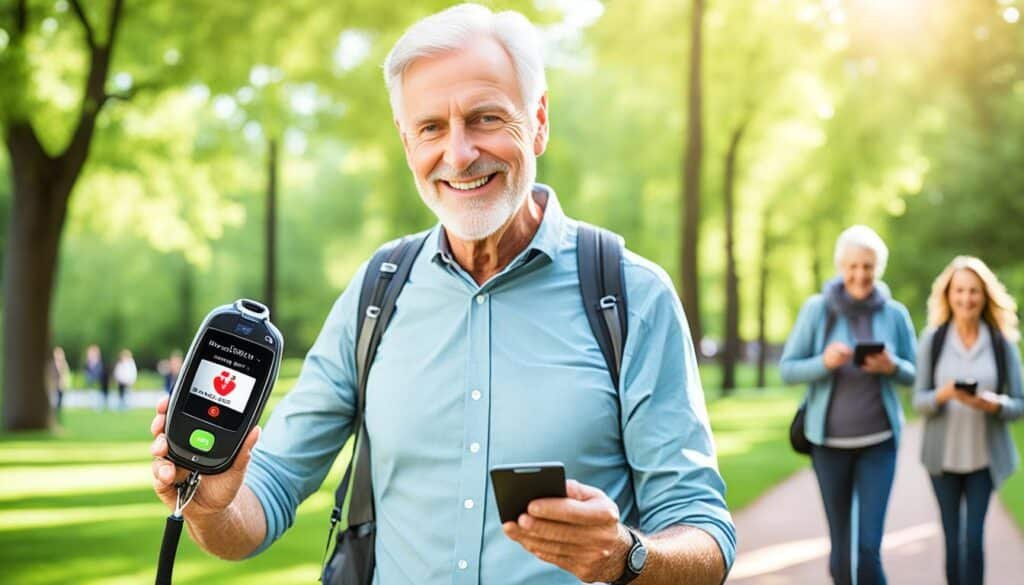
Mobile medical alert systems are designed to provide assistance to individuals who are frequently on-the-go and need access to help outside of their homes. These systems utilize advanced GPS tracking technology, along with cellular data and Wi-Fi connectivity, to accurately pinpoint the user’s location during emergencies.
With the ability to contact the monitoring center from anywhere with cellular service coverage, mobile medical alert systems offer unparalleled flexibility and convenience. Users can have peace of mind knowing that help is just a button press away, no matter where they are.
In addition to their mobility features, mobile medical alert systems often come equipped with other essential functionalities. Fall detection technology is a popular feature that automatically detects falls and alerts the monitoring center, ensuring quick response and assistance. Extended battery life is also a common attribute, allowing for prolonged use without frequent recharging.
These systems are especially beneficial for individuals who prioritize advanced fall detection capabilities and the freedom to access emergency help regardless of their location. Whether it’s a leisurely walk in the park or a cross-country road trip, mobile medical alert systems are designed to provide a safety net for individuals who are constantly on the move.
How to Choose the Right Medical Alert System
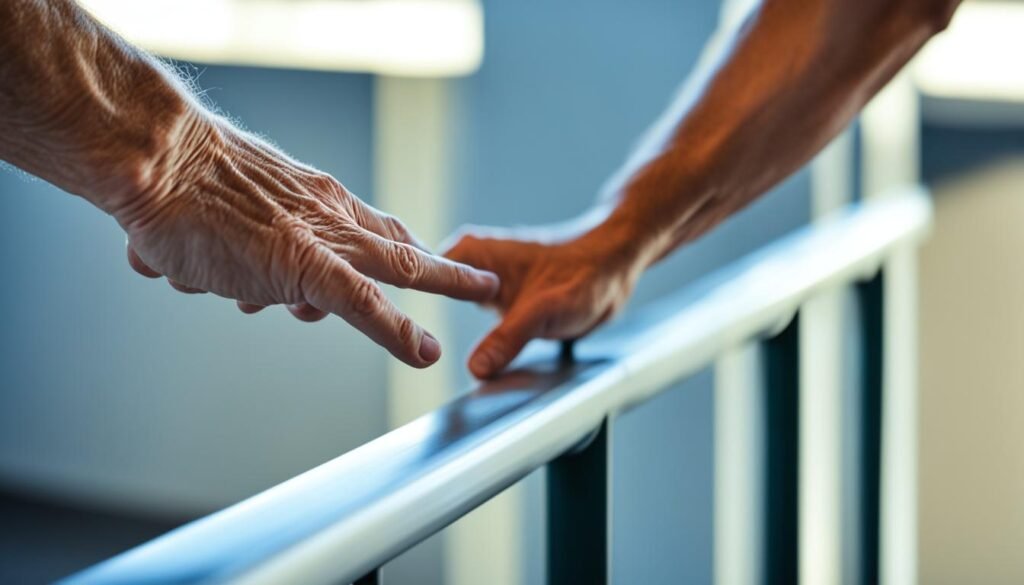
When it comes to selecting a medical alert system, it’s important to consider your specific needs, preferences, and budget. Taking the time to assess various factors can help you make an informed decision and find the right system that offers peace of mind and support. Here are some key considerations:
- Price: Compare the costs of different medical alert systems and choose one that fits your budget without compromising on quality.
- Range: Determine the range of the system, both at home and on-the-go, to ensure that you have coverage wherever you need it.
- Battery Life: Look for systems with long-lasting battery life to minimize the need for frequent charging or battery replacements.
- Device Features: Assess the features offered by different devices, such as fall detection, GPS tracking, check-in services, and voice activation, to find the ones that align with your specific requirements.
- Customer Reviews: Read customer reviews and testimonials to gauge the satisfaction level and reliability of different brands and devices.
By carefully considering these factors and comparing the options available, you can choose a medical alert system that not only prevents falls but also provides the right level of support and peace of mind for you or your loved one.
Quote:
“Choosing the right medical alert system is an important decision that can have a significant impact on your safety and well-being. Assessing factors like price, range, battery life, and device features can help you find the perfect fit.” – [Real Name], Medical Alert System Expert
Comparison of Medical Alert Systems
| Brand | Price Range | Range | Battery Life | Fall Detection | GPS Tracking |
|---|---|---|---|---|---|
| Medical Guardian | $29.95-$49.95/month | Up to 1,400 feet | Up to 5 days | Yes | No |
| MobileHelp | $19.95-$41.95/month | Up to 1,400 feet | Up to 30 days | Optional | Optional |
| LifeFone | $24.95-$44.95/month | Up to 1,300 feet | Up to 30 days | Optional | Optional |
Note: The table above provides a basic comparison of selected medical alert systems. Please refer to each brand’s official website for more detailed information and accurate pricing.
Alternative Medical Alert Systems
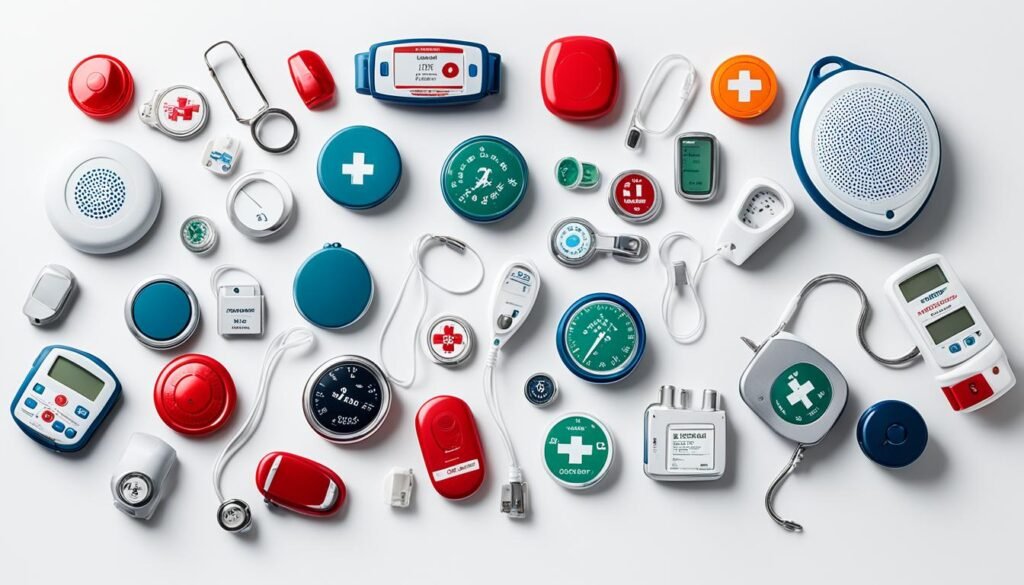
While Medical Guardian and Bay Alarm Medical are the top picks, there are other alternative medical alert systems worth considering. These systems offer different options and unique features that may better suit your needs. Here are two alternative medical alert systems:
GetSafe
GetSafe is a system that provides an alternative to wearing a traditional medical alert device. Instead, it offers voice-activated wall buttons that can be placed throughout your home. With a simple voice command, you can connect to the monitoring center and request assistance.
Aloe Care Health
Aloe Care Health offers a smart hub with motion sensors and two-way calling features. The smart hub can detect falls, unusual activity patterns, and even changes in temperature and humidity. It also allows for two-way communication, enabling you to speak directly with the monitoring center.
These alternative medical alert systems may be suitable for individuals who prefer not to wear a device or for caregivers who want advanced monitoring capabilities. It’s important to compare these options to the top picks like Medical Guardian and Bay Alarm Medical to ensure they meet your specific needs.
| Medical Alert System | Unique Features |
|---|---|
| GetSafe | Voice-activated wall buttons, no wearable device |
| Aloe Care Health | Smart hub with motion sensors and two-way calling |
The Importance of Medical Alert Systems
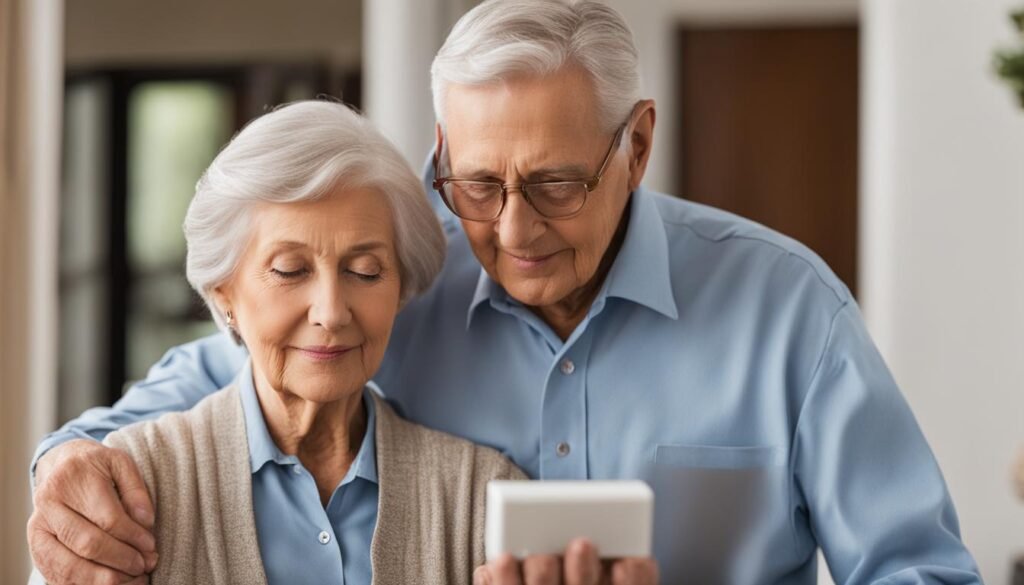
Medical alert systems play a crucial role in ensuring the safety and well-being of individuals, particularly the elderly and those with health conditions. These systems provide immediate access to emergency help with the press of a button, reducing response time during an emergency.
Medical alert systems offer a sense of security and independence, allowing individuals to live alone without constantly worrying about their safety. They act as a lifeline in situations where immediate assistance is required, giving peace of mind not only to users but also to their caregivers.
With the advancements in technology, medical alert systems have become even more reliable and effective. They offer features like fall detection, GPS tracking, and two-way communication, ensuring that help is always just a button press away.
For the elderly, medical alert systems provide a sense of comfort and confidence in their ability to live independently. They can continue to enjoy their daily activities, knowing that help is readily available in case of an emergency.
| Benefits of Medical Alert Systems |
|---|
| Immediate Access to Help: Medical alert systems provide quick access to emergency services, reducing response time and potentially saving lives. |
| Sense of Security: Knowing that help is just a button press away provides peace of mind and allows individuals to live alone without constant worry. |
| Independence: Medical alert systems empower individuals to maintain their independence and continue living their lives on their terms. |
| Peace of Mind: Users and their caregivers can rest assured knowing that emergency assistance is available 24/7. |
| Timely Assistance: Medical alert systems facilitate prompt medical attention in case of falls, injuries, or other emergencies, potentially preventing further complications. |
Whether it’s a simple home-based system or a mobile device with advanced features, medical alert systems provide an essential safety net for individuals who may require emergency help. Investing in a medical alert system can provide peace of mind and ensure the well-being of yourself or your loved ones.
Medical Alert Bracelets for Women Adjustable Personalized Free Engrave Medical ID Bracelets 6.5-8 Inch
Conclusion
Medical alert systems are vital for ensuring the safety and well-being of individuals, especially seniors and those with health conditions. These systems provide fast and reliable access to emergency help, offering peace of mind and a renewed sense of independence. When choosing a medical alert system, it is essential to consider factors such as price, range, battery life, and device features to find the right fit.
Our top picks for medical alert systems, Medical Guardian and Bay Alarm Medical, offer comprehensive coverage both at home and on-the-go. With features like long device range, extended battery life, and 24/7 monitoring, these systems provide the reassurance needed during emergencies. For individuals who prefer alternative options, choices like GetSafe and Aloe Care Health offer unique features to meet specific needs.
Whether it is an at-home or on-the-go system, a medical alert device acts as a lifeline, providing safety and security in critical situations. It reduces response time, enabling timely assistance and minimizing potential risks. With the right medical alert system, individuals can confidently navigate their daily lives, knowing that help is just a button press away.
Investing in a medical alert system is a proactive approach to safeguarding one’s well-being. These devices extend protection to vulnerable individuals, allowing them to live independently and comfortably. As technology continues to advance, medical alert systems will play an increasingly important role in ensuring the safety and security of individuals, giving them peace of mind and improving their overall quality of life.
FAQs
Q: What is a medical alert system?
A: A medical alert system is a device designed to provide instant access to emergency assistance for individuals in need. It typically consists of a bracelet or necklace with a help button that, when pressed, connects the user to a professional monitoring service.
Q: How does a medical alert system work?
A: When the help button on the medical alert bracelet or necklace is pressed, it sends a signal to a base unit connected to a phone line or cellular network. The base unit then connects the user with a trained operator who assesses the situation and dispatches appropriate help.
Q: What are the benefits of using a medical alert system?
A: Medical alert systems provide peace of mind for seniors and individuals with medical conditions by offering quick access to emergency assistance at the push of a button. They allow users to maintain their independence while ensuring help is readily available when needed.
Q: How do I choose the best medical alert system?
A: To choose the best medical alert system, consider factors such as your specific needs, budget, and features offered by different providers. Compare options that offer 24/7 monitoring, GPS tracking, fall detection, and easy setup to find the system that best fits your requirements.
Q: Are there different types of medical alert systems available?
A: Yes, there are various types of medical alert systems, including in-home systems that connect to a landline, mobile systems that use cellular networks, and wearable devices like bracelets and necklaces. Some systems also offer additional features such as automatic fall detection.
Q: What should I look for in a medical alert system for seniors?
A: When choosing a medical alert system for seniors, look for features such as easy-to-use help buttons, lightweight and comfortable wearable devices, long battery life, and reliable monitoring services with trained professionals available around the clock.
Q: How much does a medical alert system cost?
A: The cost of a medical alert system can vary depending on the provider, features included, and whether it requires a monthly subscription. Prices typically range from around $20 to $50 per month, with some companies offering discounts for annual plans.
Q: Are there free medical alert system options available?
A: Some companies may offer free medical alert system trials or promotions, but most medical alert systems require a monthly subscription fee to cover monitoring services and equipment costs. It’s important to research different providers to find the most cost-effective option for your needs.




